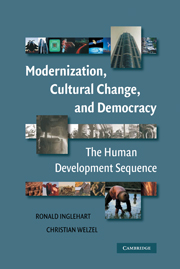Foreword by Hans-Dieter Klingemann
Published online by Cambridge University Press: 05 September 2012
Summary
This book makes a major contribution to our understanding of social and political change. It tests the impact of culture on political and social life, analyzing the broadest empirical base ever assembled for this purpose. It interprets the evidence in a bold new theoretical framework – a revised version of modernization theory. Analyzing a massive body of data from the perspective of human development theory, the authors produce something that has been declared dead: grand theory.
They demonstrate that fundamental changes are occurring in the belief systems of publics around the world. They show how these changes are shaped by an interaction between the forces of socioeconomic development and persisting cultural traditions. And using data from representative national surveys in eighty societies, the authors demonstrate that changing mass values are producing growing pressures for the establishment and strengthening of democracy.
Earlier versions of modernization theory did not foresee the massively strong linkage that the authors find between rising self-expression values and the emergence and flourishing of democratic institutions. Building on previous work by Welzel, the authors convincingly argue that socioeconomic modernization, rising liberty aspirations, and the quest for democratic institutions all reflect the common underlying process of human development, the theme of which is the broadening of human choice.
This book succeeds in integrating a vast amount of empirical evidence into a coherent theoretical framework, enriching our understanding of how democracy emerges and survives. Its findings have major substantive importance.
- Type
- Chapter
- Information
- Modernization, Cultural Change, and DemocracyThe Human Development Sequence, pp. ix - xPublisher: Cambridge University PressPrint publication year: 2005
- 1
- Cited by



